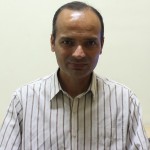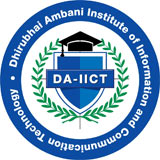Dhirubhai Ambani Institute of Information and Communication Technology, Gandhinagar
- PG Admissions 2023 Announced
- | Ph.D. Admissions 2023 Announced
- | Admission Helpline - Voice call: 080 66 91 91 80
- M.Tech. (EC) - last date 28th April 2022
- Admission Helpline - Voice call: 080 66 91 91 80
- UG Admissions - All India Category - Admission Status Announced
Yash Vasavada

Contact Details
Biography
Yash Vasavada is currently a Professor at DAIICT, and he works in the areas of communication system design and development and application of machine learning algorithms to communications and signal processing. He has over twenty years of experience at Hughes Networks systems in Germantown, Maryland, USA, where he has worked on design, development and deployment of a number of GEO, MEO and LEO satellite systems. At Hughes, Yash has published several journal and conference papers, and he has been granted twelve US Patents. Yash has obtained B. E. degree in Electronics and Communications from L. D. Engineering College, Ahmedabad, and M.S. and Ph.D. degree from Virginia Polytechnic Institute and State University (Virginia Tech) in USA.
Specialization
Communication, Signal Processing, Machine Learning
Meet Prof. Yash Vasavada: A Passionate Researcher in Wireless Communications and Signal Processing
Publications
Selected Publications
- Yash Vasavada, Michael Parr, Nidhi Sindhav, and Saumi S., "A Space-Frequency Processor for Identifying and Isolating GNSS Signals Amidst Interference," IEEE Signal Processing Letters, IEEE, ISSN: 1558-2361, vol. 32, 11 Aug. 2025, pp. 3615-3619, doi: 10.1109/LSP.2025.3598159.
- B. B. John, A. Dutta and Y. Vasavada, "Unoptimized Reflecting Surfaces for Transmit Index Modulation," in IEEE Transactions on Vehicular Technology, doi: 10.1109/TVT.2025.3640006.
- Y. Vasavada, A. Dhami and J. H. Reed, "A Low-Complexity Blind Iterative Approach for Receive-Side Hybrid Beamforming," in IEEE Transactions on Communications, April 2024, doi: 10.1109/TCOMM.2024.3388843.
https://ieeexplore.ieee.org/document/10499830 - Y. Vasavada, B. B. John, “Low Complexity Optimal and Suboptimal Detection at Spatial Modulation MIMO Receivers,” IEEE Transactions on Vehicular Technology, January 2022
- N. Shah, Y. Vasavada, “Neural Layered Decoding of 5G LDPC Codes,” IEEE Communications Letters, September 2021
- Y. Vasavada, A. Dhami, J. H. Reed, N. Shah, “Low-Complexity Blind Hybrid Beamforming for mmWave MIMO Reception,” 2022 International Conference on Signal Processing and Communications (SPCOM), 2022
- Y. Vasavada, B. B. John, “Constellation Designs for the Spatial Modulation MIMO Systems for Improved Reliability of the Information Transfer in the Spatial Dimension,” 2022 International Conference on Signal Processing and Communications (SPCOM), 2022
- B. B. John, Y. Vasavada, “Analysis of the Matched Filter Detector of the Antenna Index in the Spatial Modulation Systems,” 2022 National Conference on Communications (NCC), 1-6, 2022
- Y. Vasavada, N. Parekh, A. Dhami, C. Prakash, “A Blind Iterative Hybrid Analog/Digital Beamformer for the Single User mmWave Reception using a Large Scale Antenna Array,” 2021 National Conference on Communications (NCC), 1-6, 2021
- Y. Vasavada and C. Prakash, “Sub-Nyquist Spectrum Sensing of Sparse Wideband Signals Using Low-Density Measurement Matrices,” in IEEE Transactions on Signal Processing, vol. 68, pp. 3723-3737, 2020, doi: 10.1109/TSP.2020.3000637.
- Y. Vasavada, C. Ravishankar, and D. Roos, Correcting satellite pointing direction. U.S. Patent 10,509,097, 2019
- Y. Vasavada, A. A. Beex and J. H. Reed, “Iterative Channel and Symbol Estimation for OFDM and for SIMO Diversity,” 2018 International Conference on Signal Processing and Communications (SPCOM), Bangalore, India, pp. 267-271, 2018, doi: 10.1109/SPCOM.2018.8724486.
- Y. Vasavada, and C. Prakash, “An Iterative Message Passing Approach for Compressive Spectrum Sensing,” IEEE International Conference on Advances in Computing, Communications and Informatics (ICACCI), 2017. DOI: 10.1109/ICACCI.2017.8125834
- Y. Vasavada, D. Arur, C. Ravishankar, “User Location Determination Using Delay and Doppler Measurements in LEO Satellite Systems,” IEEE Military Communications Conference (MILCOM), 2017. DOI: 10.1109/MILCOM.2017.8170797
- Y. M. Vasavada, A. A. L. Beex and J. H. Reed, “SIMO Diversity Reception in Rayleigh and Rician Fading with Imperfect Channel Estimation,” IEEE International Conference on Advances in Computing, Communications and Informatics (ICACCI), 2016. DOI: 10.1109/ICACCI.2016.7732030
- Y. Vasavada, R. Gopal, C. Ravishankar, G. Zakaria, and N. BenAmmar, Architectures for Next Generation High Throughput Satellite Systems. International Journal Satellite Communication Network, 2016. DOI: 10.1002/sat.1175
Teaching
- Introduction to Communication Systems
- Advanced Digital Communications
- Next Generation Communication Systems

